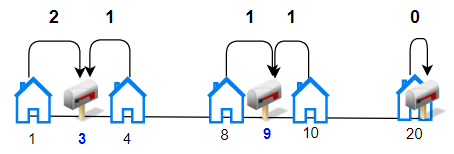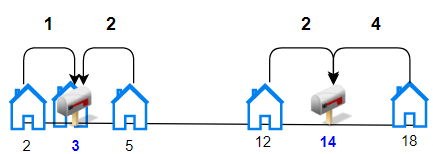Description
Given the array houses where houses[i] is the location of the ith house along a street and an integer k, allocate k mailboxes in the street.
Return the minimum total distance between each house and its nearest mailbox.
The test cases are generated so that the answer fits in a 32-bit integer.
Example 1:

Input: houses = [1,4,8,10,20], k = 3 Output: 5 Explanation: Allocate mailboxes in position 3, 9 and 20. Minimum total distance from each houses to nearest mailboxes is |3-1| + |4-3| + |9-8| + |10-9| + |20-20| = 5
Example 2:

Input: houses = [2,3,5,12,18], k = 2 Output: 9 Explanation: Allocate mailboxes in position 3 and 14. Minimum total distance from each houses to nearest mailboxes is |2-3| + |3-3| + |5-3| + |12-14| + |18-14| = 9.
Constraints:
1 <= k <= houses.length <= 1001 <= houses[i] <= 104- All the integers of
housesare unique.
Solution
Python3
class Solution:
def minDistance(self, houses: List[int], k: int) -> int:
N = len(houses)
houses.sort()
costs = [[0] * N for _ in range(N)] # total travel distance from houses[i : j] to the median mailbox
for i in range(N):
for j in range(N):
median = houses[(i + j) // 2]
for m in range(i, j + 1):
costs[i][j] += abs(median - houses[m])
@cache
def go(i, k):
if i == N: return 0
if k == 0 or i == N: return inf
res = inf
for j in range(i, N):
cost = costs[i][j]
res = min(res, go(j + 1, k - 1) + cost)
return res
return go(0, k)